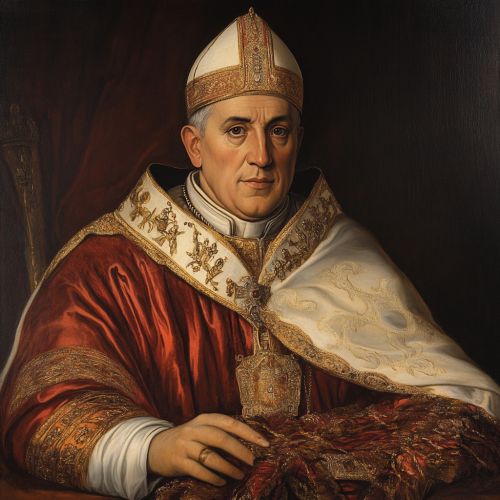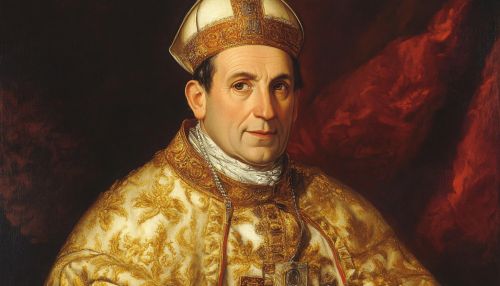Alexander VI: Difference between revisions
(Created page with "== Early Life and Background == Rodrigo de Borja, later known as Pope Alexander VI, was born on January 1, 1431, in Xàtiva, near Valencia in the Kingdom of Aragon, which is now part of modern Spain. He was a member of the prominent Borgia family, known for their influence and power within the Catholic Church and European politics. His uncle, Alonso de Borja, ascended to the papacy as Pope Callixtus III in 1455, which significantly boosted Rodrigo's ecclesiastical career...") |
No edit summary |
||
| Line 13: | Line 13: | ||
Pope Alexander VI's papacy was characterized by his political acumen and his efforts to consolidate power for the Borgia family. He sought to strengthen the temporal power of the papacy and expand the influence of his family through strategic marriages and alliances. His children, particularly Cesare and Lucrezia Borgia, played significant roles in his political strategies. | Pope Alexander VI's papacy was characterized by his political acumen and his efforts to consolidate power for the Borgia family. He sought to strengthen the temporal power of the papacy and expand the influence of his family through strategic marriages and alliances. His children, particularly Cesare and Lucrezia Borgia, played significant roles in his political strategies. | ||
[[Image:Detail-98113.jpg|thumb|center|Portrait of Pope Alexander VI in papal regalia.|class=only_on_mobile]] | |||
[[Image:Detail-98114.jpg|thumb|center|Portrait of Pope Alexander VI in papal regalia.|class=only_on_desktop]] | |||
=== Nepotism and Patronage === | === Nepotism and Patronage === | ||
Latest revision as of 14:52, 25 September 2024
Early Life and Background
Rodrigo de Borja, later known as Pope Alexander VI, was born on January 1, 1431, in Xàtiva, near Valencia in the Kingdom of Aragon, which is now part of modern Spain. He was a member of the prominent Borgia family, known for their influence and power within the Catholic Church and European politics. His uncle, Alonso de Borja, ascended to the papacy as Pope Callixtus III in 1455, which significantly boosted Rodrigo's ecclesiastical career.
Ecclesiastical Career
Cardinalate
Rodrigo Borgia was appointed as a cardinal in 1456 by his uncle, Pope Callixtus III. His cardinalate was marked by his adept administrative skills and his ability to navigate the complex political landscape of the Vatican. He held various important positions, including Vice-Chancellor of the Holy See, which allowed him to amass considerable wealth and influence.
Election as Pope
Rodrigo Borgia was elected pope on August 11, 1492, taking the name Alexander VI. His election was controversial, with allegations of simony and corruption. It is widely believed that he secured his election through substantial bribes and political maneuvering, a common practice in the papal conclaves of the time.
Papacy
Political Maneuvering
Pope Alexander VI's papacy was characterized by his political acumen and his efforts to consolidate power for the Borgia family. He sought to strengthen the temporal power of the papacy and expand the influence of his family through strategic marriages and alliances. His children, particularly Cesare and Lucrezia Borgia, played significant roles in his political strategies.


Nepotism and Patronage
Alexander VI is often criticized for his nepotism, as he appointed several of his relatives to high-ranking positions within the church and secular governments. His son, Cesare Borgia, was made a cardinal and later a military leader, while his daughter, Lucrezia Borgia, was married off to powerful noble families to secure political alliances.
Conflict and Controversy
Alexander VI's papacy was marred by numerous conflicts and controversies. He faced opposition from various factions within the church and from secular rulers who resented his attempts to expand papal authority. His involvement in the Italian Wars and his alliances with France and Spain further complicated his reign.
Legacy and Impact
Reformation and Counter-Reformation
The corruption and moral decay associated with Alexander VI's papacy contributed to the growing discontent that eventually led to the Protestant Reformation. His actions and the general state of the church during his time highlighted the need for reform, which was later addressed by the Counter-Reformation.
Cultural Patronage
Despite his controversial papacy, Alexander VI was a patron of the arts and played a role in the cultural flourishing of the Renaissance. He commissioned various works of art and architecture, contributing to the beautification of Rome and the promotion of Renaissance culture.
Death and Succession
Pope Alexander VI died on August 18, 1503, under mysterious circumstances. His death marked the end of an era characterized by political intrigue and corruption. He was succeeded by Pope Pius III, who had a brief papacy, followed by Pope Julius II, who initiated significant reforms and continued the efforts to restore the moral integrity of the church.
